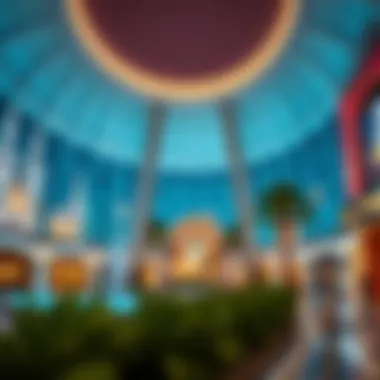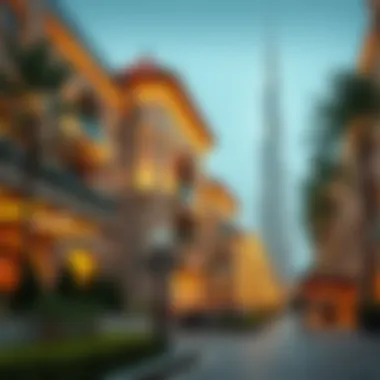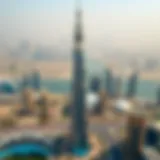Exploring the Impact of Global Village's Closing in Dubai


Intro
The impending closing date of the Global Village in Dubai doesn’t just signal the end of a popular season; it raises significant questions about the future of the local economy and the real estate market. This unique marketplace has been a melting pot of cultures, experiences, and innovations for over two decades. The ramifications of its closure reach far beyond its gates, influencing tourism, local businesses, and investment opportunities. Understanding these complexities offers a nuanced perspective for those closely linked to Dubai’s dynamic landscape.
Market Trends
With the Global Village closing, stakeholders are keenly observing the current real estate landscape in Dubai. This transition may seem abrupt, yet it provides a unique chance to evaluate ongoing trends and forecast what’s to come.
Current Real Estate Landscape
Dubai's property market has seen a marked transformation in recent years. The rise in demand for residential and commercial properties continues, even as event hubs like Global Village close. Investors might find solace in the fact that the overall sentiment remains positive, given the city's robust infrastructure and global appeal. Property values have remained relatively stable, largely due to a combination of factors like foreign investment, Expo 2020's lingering effects, and a thriving tourism sector.
Yet, the closure of the Global Village introduces some uncertainties. There’s speculation on how this may influence rental rates and occupancy levels in nearby properties. Investors should keep an eye on the shifts in tenant preference, as neighborhoods that once thrived on tourist traffic may see changes in demand.
Future Market Projections
As we peer into the crystal ball of Dubai's real estate market, projections hint towards a mixed bag. On one hand, the demand for properties is expected to continue rising, bolstered by Dubai’s status as a business hub. On the other hand, the Global Village's closure may dampen the tourism influx in the short term, presenting challenges for businesses that relied on the foot traffic it generated.
Analyzing future trends means considering various components:
- Investment influx: Investors may look towards alternative attractions and developments in Dubai.
- Price adjustments: Areas previously buoyed by tourism may see fluctuations in property values.
- Changing dynamics: A pivot to more local experiences rather than solely relying on tourist attractions raises the prospects of community-oriented developments.
All these notes point towards a future of adaptation and resilience in the real estate sector.
Investment Insights
For investors eyeing opportunities post-Global Village, keen insights become paramount to navigating the changing landscape.
Key Considerations for Investors
The closure of the Global Village calls for astute decision-making when investing in Dubai's property market. Potential investors should consider the following:
- Market Research: Tracking trends in areas surrounding the Global Village can uncover potential opportunities.
- Diversification: Focusing on varied property types can mitigate risks involved with shifts in tourist-driven markets.
- Long-term Planning: In a city renowned for its fast-paced changes, investors should prepare for the long haul rather than seek quick gains.
Property Management Tips
When it comes to effective property management during this transitional phase, adopting flexible strategies is vital:
- Reassess Tenant Mix: A diverse tenant profile could safeguard against downturns in tourism.
- Enhance Features: Consider upgrading properties to cater to long-term residents rather than short stays driven by tourism.
- Engage with Local Community: Building ties with the community may provide stability as you navigate changing market demands.
"Investing in knowledge pays the best interest."
– Benjamin Franklin
For a closer look at Dubai’s real estate nuances, consider resources like Dubai Land Department and real estate investment groups on platforms like Reddit.
This evolving narrative offers numerous opportunities and challenges in the face of an ever-changing landscape.
Prelims to Global Village
The Global Village in Dubai is not just an entertainment venue; it’s a vibrant blend of cultures that has captured the essence of globalization. To understand the implications of its upcoming closing date, one must first appreciate what Global Village represents — a meeting point for numerous cultures, cuisines, and innovations. It showcases not only local heritage but also international artistry, making it a significant player in Dubai's tourism landscape.
In a world increasingly defined by interconnectivity, Global Village stands as a symbol of cultural exchange. It attracts millions of visitors each year, both local and international, contributing greatly to the region's economy. The atmosphere is buzzing with the laughter of families, the aromas of international delicacies, and the sounds of various performances. This thriving hub of activity brings together a myriad of attractions, from thrilling rides to taste-testing culinary delights, creating an experience that resonates with people of all ages.
The impending closure raises several considerations:
- Cultural Impact: What does the end of this vibrant platform mean for cultural representation in the region?
- Tourism Effects: How will this affect the visitor traffic, and what adjustments can be anticipated in the tourism industry?
- Economic Consequences: Given the substantial economic benefits derived from this venue, what ripple effects might we observe in local businesses?
Thus, comprehending the context surrounding Global Village's closing date is imperative for stakeholders — from local entrepreneurs to property managers and investors. This exploration not only highlights the current challenges but also offers insights into potential future ventures.
Historical Context
Established in 1997, Global Village has evolved significantly over the years. It began as a modest gathering of local businesses and has burgeoned into a full-scale, internationally recognized festival park. At one time, it was an initiative aimed at promoting economic growth and encouraging cultural tourism. The site's inception was a response to the need for a venue that could accommodate Dubai's diversifying population and their interests.
Over the years, Global Village has witnessed numerous renovations and expansions. The introduction of themed pavilions representing various countries has enhanced the cultural richness and visitor engagement. Understanding this history provides a clearer picture of why its impending closure is so impactful; it has become more than just an entertainment venue, but a landmark symbolizing Dubai's global identity.
Overview of Attractions
The attractiveness of Global Village is undeniable, presenting a variety of activities that cater to all whims. The range of attractions includes:
- Cultural Pavilions: Each pavilion invites guests to immerse themselves in the culture of different countries, featuring unique handcrafted products and traditional cuisine.
- Rides and Games: For thrill-seekers, amusement rides transformed the landscape into a carnival on steroids, lending a sense of adventure and excitement.
- Live Performances: Entertainment comes in various forms—musicians, dancers, and cultural shows bring the stage alive, showcasing talents from around the globe.
This melting pot of experiences not only entertains but also educates visitors about the rich tapestry of global cultures. As discussions about the closure unfold, it is essential to reflect on these attractions and consider their potential disappearance from the Dubai tourism scene.
Announcement of Closing Date
The announcement regarding the closing date of the Global Village has sent ripples across numerous sectors, especially tourism and local businesses in Dubai. This decision isn't simply a shift in operation; it's intertwined with the cultural fabric and economic threads that form the lifeline of the community. Understanding this date's significance helps elucidate the broader implications on local stakeholders, making it an essential focal point of discussion.
Official Statements
When the news broke about the impending closure, officials took to various media platforms to clarify reasons and expectations. The response was straightforward: they cited the need for periodic renewals and transformations to keep the attraction fresh and appealing. Watching their words, one can perceive an agenda that balances economic vitality with operational realities.
Additionally, a press release outlined plans for potential upgrades, intending to reinforce that this move is not solely an end but a preparation for a new chapter. Key figures from the Dubai government underscored that the closure is a strategic measure designed to align with the city’s long-term vision. A deeper examination of these statements reveals that authorities are not merely closing a venue but are attempting to elevate the collective experience for visitors and residents alike.
“The Global Village serves not just as a marketplace but as a cultural tapestry of our society. Its temporary closure aims to revamp, envisioning a space that will better resonate with future generations.”
This statement resonates deeply with many, reflecting the sentiment that while goodbye can be hard, it often paves the way for better opportunities. However, not all interpret these intentions as entirely benign, prompting discussions about the depth and accuracy of the governing bodies' shared message.


Public Reactions
The reactions from the public have been as varied as the cultures represented in Global Village itself. Social media exploded with commentary; some individuals expressed disappointment, while others saw it as a necessary evolution.
- Disappointment: Many regular visitors who frequented the Global Village for its unique attractions and diverse food options voiced their concerns about losing a beloved staple of their social calendar. Comments ranged from nostalgic recollections of family visits to fears about what this change may mean for the future of cultural events.
- Optimism: Conversely, a notable faction expressed excitement at the potential for innovation. These individuals view the closure as a golden opportunity for revitalization, hoping that future incarnations will introduce cutting-edge experiences and new cultural showcases.
The crossroads of opinion create a tapestry of conversation that could influence future developments. As some mourn the loss of what used to be, others are already envisioning what could come next, demonstrating the contrasting dynamics at play. The blend of skepticism and hope resonates through local community forums and beyond, indicating an ongoing dialogue about the space's future.
In summary, the announcement of the closing date for the Global Village serves as more than just a notification. It signifies a pivotal moment that encapsulates the essence of change, culture, and economics in Dubai. Stakeholders, including investors and property managers, must navigate through these turbulent waters, discerning the layers of implications that this closure invokes.
Impact on Tourism
The effect of the Global Village closing date on tourism is a crucial theme to explore, given its significance in shaping the dynamics of the socio-economic landscape in Dubai. This event not only poses challenges but also opportunities for various stakeholders involved in the tourism sector.
Visitor Patterns
The closing of the Global Village undoubtedly influences visitor patterns, as this venue has been a major draw for both residents and tourists alike. Usually bustling with a vibrant mix of cultural displays and entertainment, it attracts millions annually. The anticipated closure raises several questions about how visitors will redirect their interest once this key attraction is off the map.
As the clock ticks down to the closing date, one might see an initial surge in visitors eager to experience the venue one last time, perhaps leading to overwhelming crowds in the final months. This phenomenon can be likened to a concert's last show—where fans flock in droves to soak in the final performance.
However, it may lead to a longer-term dip in tourist interest in the area. The temporary loss of such a significant attraction could push tourists to explore alternative sites in Dubai or even consider different destinations altogether. Tour operators may need to rethink their itineraries to incorporate other attractions to fill the void left by the Global Village, highlighting the shifting landscape of tourism in the region.
Economic Contributions
To grasp the full ramifications of the closing date, one must delve into economic contributions attributed to the Global Village. Historically, this complex generated a substantial revenue stream, not only for itself but also for local businesses, artisans, and international vendors who thrived in its vibrant market.
The volume of visitors was a lifeblood for the surrounding areas. When tourists frequented the Village, they often wandered beyond its gates—venturing into nearby shops and restaurants. This spillover effect contributed significantly to the local economy. A sudden cessation of this flow could prove damaging for small businesses reliant on this influx, leading to potential closures and job losses.
Furthermore, the Global Village has been a platform for cultural exchange, providing local artisans with a space to showcase their work. The closure could mean diminished opportunities for many who depend on this venue for visibility and sales. The economic ramifications extend beyond immediate impacts; it could alter Dubai’s tourism appeal in the long run.
"The Global Village is not just a tourist spot; it’s a cornerstone in the economic fabric of Dubai. Its absence will be felt across multiple sectors."
In summary, the impact on tourism can be seen as a double-edged sword. While a temporary surge in visitors may occur as people scramble to experience the last of what Global Village offers, the potential for longer-term declines in economic activity and shifts in visitor preferences creates a landscape fraught with uncertainty. As the Global Village wraps up its season, stakeholders in the tourism sector must tread carefully to navigate these tumultuous waters.
Local Business Landscape
The significance of the local business landscape in the wake of the Global Village's impending closure cannot be overstated. This closure is not just a logistical shift; it signals potential disruptions that trickle down to the very fabric of the community—small businesses. Understanding these implications is crucial for stakeholders, whether they are investors, property managers, or domain specialists analyzing the market. The narrow focus often falls on tourism stats or real estate trends, yet the backbone of Dubai's economy—the small business sector—requires equal attention.
Effects on Small Businesses
Small businesses form the lifeblood of any community, acting as a robust support system for local economies. The closure of the Global Village presents both challenges and opportunities for these establishments. As the tourist traffic dwindles, local shops, eateries, and stalls could face significant revenue dips. For many small businesses who thrive on the influx of visitors, adapting to this sudden lack of foot traffic will be essential.
While some may struggle, others might pivot to cater to local residents rather than tourists. Resilience is key. Small businesses that had depended heavily on seasonal visitors must quickly recalibrate their offerings to target their local market. For example, a souvenir shop that saw its biggest sales in winter months might start expanding its local art offerings, thereby building a thriving local customer base that can sustain it through leaner seasons.
"Change presents challenges, but often unveils silver linings—even for the businesses that find it hard to pivot."
In the long run, those small businesses that can adapt to changing consumer preferences will define the new local business landscape post-closure. Developing strong customer relationships and focusing on community engagement will be essential strategies.
Changes in Consumer Behavior
The local business landscape will likely witness shifts in consumer behavior. A market that flourished on tourist spending will now need to address discerning local tastes. As residents begin to form the new norm of consumer behavior, expect preferences to evolve markedly. This landscape could signal opportunities for tailored marketing strategies that reflect the community's values and needs.
- Increased Local Loyalty: Online platforms offer functionalities that inform consumers about local businesses. Users will likely favor businesses supporting locals.
- Focus on Sustainability: As awareness of environmental issues grows, local businesses emphasizing sustainable practices could see an uptick in interest.
- Digital Pivot: Many small businesses might need to ramp up their online presence, appealing to customer convenience. From takeaways to delivery services, businesses that leverage technology will likely see better engagement.
The decisions made by local businesses now could carve out long-lasting effects. With many relying on past behaviors shaped largely by tourism, a proactive shift towards local-based strategies will not only be wise but necessary in navigating this challenging landscape.
Real Estate Market Analysis
The significance of analyzing the real estate market in the context of the Global Village's closing date cannot be overstated. As the leading cultural and entertainment hub in Dubai, this closure will inevitably cast ripples through the property market. Investors, buyers, and property managers will closely monitor fluctuations in property values and investment opportunities that emerge as a consequence.
Understanding the intricacies of the real estate market during this transitional phase offers a dual advantage: it equips stakeholders with the foresight to navigate impending changes, and it sheds light on how these changes can influence future investments.
Property Value Trends
With the impending closure of the Global Village, property values in the surrounding areas are likely at a crucial tipping point. Historically, properties near major tourist attractions tend to hold their value well, but such closures can initiate a downward shift in demand.
- Market Observations: Real estate trends around similar closures reveal a mixed bag of outcomes. For instance, some properties witnessed a drop in prices due to decreased foot traffic, while others maintained their worth by diversifying their offerings.
- Comparative Analysis: If we look at the effects of closures like those of historic amusement parks or festivals, we see that surrounding property values often mirror the attractiveness of alternative draw cards that arise after such events. This nuanced relationship means that current owners and potential investors must stay abreast of evolving local demands.
The challenges faced by local real estate can be somewhat mitigated by offering new amenities or services to adapt to shifting consumer preferences. As headline news about the Global Village's closing continues to circulate, property owners and investors should pay attention to trends emerging in similar urban settings.
Investment Opportunities
Every cloud has a silver lining, and in the case of the Global Village's closure, discerning investors might find unique opportunities for growth.
- Land Development: A potential rise in available spaces post-closure can set the stage for new developments. As businesses adapt and consumers change their habits, there are openings for building residential or mixed-use complexes that cater to a different demographic altogether.
- Commercial Ventures: The need for adapting existing commercial properties to better suit newcomers could lead to revitalization projects. Investors willing to take the plunge could capitalize on a fresh market angle, targeting local residents rather than tourists, with necessary services that residents truly need.
- Secondary Markets: Monitoring secondary markets that could experience a rise in demand is equally vital. Historical trends suggest that nearby areas often benefit from infrastructural developments after a major attraction closes, creating a fertile ground for investment.
In essence, while a real estate market analysis during this transitional period may reveal challenges, it also uncovers avenues ripe for exploration. Investors willing to observe, analyze, and adapt to evolving trends can position themselves favorably when the dust settles.
Comparative Events
The examination of comparative events surrounding the impending closure of the Global Village provides useful insights. Understanding different scenarios where similar closures have occurred can shine a light on potential outcomes and strategies that might effectively mitigate negative impacts. This analysis is particularly essential for investors, buyers, and property managers who are keen on discerning how to navigate through instances of market uncertainty.
Analysis of Previous Closures
In history, closures of large attractions and events are often seen as seismic shifts in local economies. For instance, the temporary closure of the Expo 2020 site post-event raised alarms about the future of tourism in Dubai. The event brought millions of visitors but left behind questions about sustainable attraction after the fact.


Another pivotal example is the Oktoberfest in Germany, which faced cancellations due to health concerns. The fallout included significant impacts on local breweries and hospitality sectors reliant on the influx of tourists. Observing these scenarios reveals how closures can serve as a double-edged sword; they create opportunities for reflection and possible revitalization but also risk economic downturns if not managed properly.
"Past closures teach us vital lessons about resilience and adaptation in business and tourism sectors."
For the investors eyeing the real estate implications, understanding these previous occurrences helps gauge potential volatility in property values. In the case of Global Village, the similarities may include a quick spike in residential demand due to the initial tourism surge that follows the reopening, mirroring patterns seen elsewhere.
Lessons Learned
The crux of analyzing past closures stems from the lessons learned in recovery strategies and consumer engagement techniques.
- Adapting to Change: Businesses that adapted swiftly to new realities, like modifying offerings or pivoting to online services, often mitigated the effects of downturns. For instance, during the Oktoberfest cancellations, many breweries shifted to online sales and home-delivery models, thereby maintaining business relevance.
- Community Role: Engaging the local community proved crucial. Events that fostered community involvement during tough times saw better recoveries. Public participation not only builds loyalty but also creates a sustainable consumer base post-closure.
- Marketing Resilience: Brands that emphasized local experiences and attractions were often able to cushion the blow when major events ceased. Promoting nearby parks, historical sites, or smaller cultural events can help sustain local economies.
In summary, the importance of viewing the closing of the Global Village through the lens of comparative events and the lessons learned offers a clearer picture to anticipate the potential shifts in the Dubai landscape. Investors and stakeholders can derive significant insights by studying these past instances, thereby honing their strategies in navigating unique challenges ahead.
Future of Global Village
The future of the Global Village holds significant importance not just for Dubai, but for investors and community stakeholders alike. As the world watches how this landmark responds to the impending closure, various avenues for growth and transformation come into focus. This section aims to dissect recent developments regarding its plans for reopening and the long-term vision that might reshape Dubai’s cultural and economic landscape.
Plans for Reopening
Understanding the plans for reopening the Global Village is essential to grasping its future trajectory. Local authorities have hinted at ambitious initiatives that aim to revive the site after its closure. The reopening plans involve collaborating with stakeholders, from local artisans to international performers, ensuring that the vibrant tapestry of cultures and experiences continues to thrive. These strategies will likely encompass:
- Enhanced Visitor Experience: By integrating technology, the site could become a benchmark for modern attractions, with virtual tours and interactive installations that captivate both residents and tourists.
- Sustainability Initiatives: This could be a reaffirmation of Dubai's commitment to sustainability, as the Global Village aims to incorporate eco-friendly practices. Initiatives may include solar panels, waste reduction programs, and urban gardening.
- Cultural Revitalization: As a melting pot of cultures, revitalizing the Global Village might involve curated events that celebrate international traditions, arts, and food, bringing back the essence that initially attracted millions.
Through these planned initiatives, the focus remains on preserving what made the Global Village a beloved destination while adapting to new realities. This synthesis of tradition and innovation is vital for appealing to an evolving audience.
Long-Term Vision
Moving beyond just reopening, the long-term vision for the Global Village is a pivotal element in understanding its lasting legacy. This vision aims to reposition the Global Village as an emblem of multicultural interaction and sustainable tourism. Key components of the long-term vision may include:
- Integration with Smart City Goals: The Global Village's future could align with Dubai's broader ambition to be a smart city. High-tech facilities, smart mobility solutions, and integrated services will likely be a part of the game plan.
- Investment in Infrastructure: To accommodate growing visitor numbers and enhance accessibility, investments in transportation networks and accommodation facilities around the Global Village will likely play a crucial role.
- Community Engagement: Involving local communities in the planning and implementation processes can strengthen ties. Hosting workshops and gather feedback on the site's offerings will help to ensure that the Global Village resonates with both residents and visitors.
The long-term vision reflects a commitment to adaptability, ensuring that the Global Village remains relevant amid changing societal expectations and global trends. By addressing the concerns of both the local populace and tourists, a collaborative model of growth can emerge that reinforces community ties and economic viability.
"The future is not something we enter. The future is something we create." – Leonard I. Sweet
In sum, the future of the Global Village is poised at an exciting juncture, filled with possibilities and potential challenges. The direction taken after the closure will undoubtedly make waves across the tourism, cultural, and economic sectors in Dubai.
Government and Regulatory Insights
Understanding the role of government and regulations is crucial in unpacking the implications of the Global Village's closing. The shifting landscape of policies directly impacts investors, property managers, and potential buyers looking at the real estate dynamics in Dubai. With the impending closure, it's essential to analyze how governmental decisions will reshape the environment surrounding this landmark.
Policies Affecting Real Estate
Real estate in Dubai has been under steady evolution, influenced by a variety of governmental policies. The closing of the Global Village generates a ripple effect on these regulations. Firstly, there's a potential shift in zoning laws. As areas previously dedicated to tourism and commercial activities reassess their purpose, policymakers may introduce new zoning classifications or modify existing ones to accommodate alternative developments.
Additionally, incentives for investors may be adjusted. Generally, the Dubai government champions foreign investment, and it is likely that following the closure, there will be incentives that favor property development projects which align with the new vision for the area.
Moreover, any changes in tourism policies could have an impact on how real estate is valued. As visitors begin to reevaluate their plans, properties depicting attributes attractive to tourists may gain more significance. This could lead to fluctuating demand for short-term rentals in nearby areas.
Here are several key considerations regarding policies that might be affected:
- Zoning regulations: Future adjustments to zoning may emerge as a need for restructured urban planning arises.
- Incentives and subsidies: A strategic push from the government could encourage economic recovery and attract developers.
- Tourism policies: These changes could influence investments in hospitality and related sectors.
Regulatory Changes Post-Closure
Once the Global Village closes, the regulatory landscape may experience notable transformations. The government might introduce specific regulations to manage the transition, providing clear guidelines for former stakeholders and new entrants. These changes can shape property values and determine the market's direction.
One immediate regulatory consideration is the impact on rental agreements and property management standards. A volatility in the market is expected, prompting authorities to clarify lease conditions and protect the rights of tenants and landlords alike.
Furthermore, as the infrastructure around Global Village is put to the test, updates and changes such as maintenance requirements or safety standards might necessitate regulatory responses. These modifications can encompass a wide range from enhanced building safety codes to environmental regulations aimed at promoting sustainable development in light of the change in land usage.
Some potential regulatory shifts could include:
- Lease conditions: Updates to protect stakeholders affected by sudden market shifts.
- Development approvals: Streamlined processes for proposals that align with new developmental goals.
- Environmental assessments: New assessments may be mandated to ensure future projects adhere to green building practices.
By examining these governmental and regulatory insights, stakeholders can better position themselves to adapt to the upcoming changes in Dubai’s landscape. Understanding upcoming trends is key to making informed decisions.
Cultural Impacts
The impending closure of the Global Village symbolizes more than just the closing of an entertainment venue; it triggers a chain reaction affecting cultural dynamics within Dubai and beyond. The essence of the Global Village lies in its unique representation of diverse cultures, offering a vibrant glimpse into traditions, cuisines, and arts from around the globe. The event’s end invites us to reflect on both its cultural significances and the potential gaps it will leave behind.
Representation of Cultures
The Global Village has acted as a microcosm of the world. By bringing together pavilions from multiple countries, it has played a pivotal role in promoting cultural exchange. From the Mexican mariachi bands to Turkish folk dances, and Indian handicrafts, the venue was a canvas displaying the world’s richness.
But as it wraps up operations, we must ask: what happens to the narratives and experiences it shared? One of the crucial aspects of cultural representation at this venue was the interaction it fostered among communities, providing a space for learning and understanding. For investors and buyers, the loss of such a melting pot raises questions about how to preserve cultural diversity in the tourism sector moving forward.
Moreover, the Global Village offered local artisans a chance to showcase their crafts, paving paths to sustainable income. This has a direct bearing on the market for such products; with the village's closure, there is a risk of these cultural treasures fading into the background. If local businesses can’t find platforms to share their stories, entire cultural practices might vanish.
Community Reactions
The response from the community surrounding the closure has been mixed. For many residents, the Global Village was not just a venue; it was a cherished memory, a meeting point for families, and a hub for celebrating the camaraderie found in diversity. Reminiscing about the festivities, local residents frequently express sentiments like, “it just won’t be the same without it.” The emotional attachment exhibits how intertwined the venue has become with the community’s identity.
However, others are trying to look on the bright side, viewing this closure as an opportunity for new initiatives. There are discussions within local government and organizations about how this space might be repurposed.


In terms of investments and community engagement, it's essential to take note of the following:
- Cultural Preservation: Initiatives aimed at maintaining cultural activities even after the Global Village closes.
- Local Events: Potential local events intended to fill the gap left by the village and continue educating about various cultures.
- Community Projects: Projects focused on the needs and voices of local residents, ensuring their perspectives shape the future of cultural expression in Dubai.
The air is thick with uncertainty, but one thing is clear: as the curtain falls on the Global Village, the future of cultural representation in Dubai will require careful navigation. Reflecting on community sentiments will be vital in devising strategies that keep cultural stories alive and foster a strong sense of identity among the residents.
“Culture is the sum of all the stories we tell each other. Losing a platform like the Global Village means we need new ways to share those stories.” - Local Artist
For more insights on cultural issues, you can visit Wikipedia or explore discussions on Reddit.
Potential for New Ventures
The closing of Dubai's Global Village opens a door for fresh opportunities and inventive business models. Entrepreneurs and investors can leverage this transitional period to explore new avenues, reshaping the local marketplace. Understanding the potential for new ventures amid this chaos is crucial for staying ahead in a rapidly evolving economy.
In examining this potential, it’s key to consider the critical elements that may shape the new landscape. Given that Global Village was a melting pot of culture, innovation, and trade, its closure may create a vacuum that eager startups can fill. Businesses that previously thrived on high foot traffic can look into other formats, perhaps even digital, making use of technology to bridge the gap left behind.
Emerging Business Models
The absence of Global Village leaves space for various emerging business models. For instance, pop-up retail shops could take center stage, testing the waters without a long-term commitment, allowing entrepreneurs to adapt and change their offerings based on market demands.
Moreover, with remote work becoming increasingly common, co-working spaces could see a rise as professionals search for collaborative environments. By creating community-centric hubs, local businesses can nurture creativity, tapping into shared resources and networks.
Market Entry Strategies
When it comes to market entry strategies, businesses looking to step into Dubai's post-Global Village landscape need to consider a mix of adaptability and innovation. Establishing partnerships with local influencers can significantly elevate brand awareness. These collaborations can pivot around creating curated experiences that echo the essence of Global Village’s cultural representation.
Investors should also look at employing digital marketing strategies to maximize outreach. Social media platforms like Facebook and Instagram offer powerful tools for engaging potential customers where they spend most of their time. Offering promotions or launching campaigns that target local residents can drive initial interest in new ventures.
"In the world of business, adaptability isn’t just a skill; it’s a necessity."
In summary, while the closing of Global Village marks an end, it also signals the beginning of new ventures that can reshape Dubai’s current trading climate. By investigating innovative models and leveraging effective market entry strategies, savvy investors and business owners can turn this challenge into a golden opportunity.
Sustainability Considerations
The importance of sustainability in the context of the Global Village’s closing date cannot be overstated. As we examine the myriad implications of this closure, it becomes increasingly clear that sustainable practices will not only influence future endeavors but also shape the legacy of the Global Village itself. Sustainability, at its core, pertains to the act of meeting the needs of the present without compromising the ability of future generations to meet their own needs. Given that the Global Village has served as a symbol of cultural exchange and tourism in Dubai, understanding its environmental and societal impacts is crucial for investors, local authorities, and community members alike.
Environmental Impact
The environmental consequences tied to the closing of the Global Village are multifaceted. For starters, consider the carbon footprint generated during its operation. Events held in the village draw significant crowds, which in turn necessitate transportation, energy consumption, and waste production. As the village prepares to close its doors, stakeholders must address how to mitigate ongoing environmental impacts.
- Waste Management: One of the most pressing issues arises from the potential increase in waste as facilities shut down. Leftover materials from food stalls, exhibition spaces, and seasonal attractions can pile up unless proper management strategies are employed.
- Biodiversity Concerns: The land upon which the Global Village sits holds potential ecological significance. As operations cease, questions arise about the balance of natural habitats in the area. How is the native flora and fauna affected, and what can be done to protect these?
- Energy Consumption: The closing date sets the stage for reevaluating energy practices. Moving forward, there is a critical opportunity to transition to renewable sources that align with international environmental standards.
Ultimately, recognizing these environmental impacts can guide local activists and the government in pressing for sustainable initiatives that benefit the ecology of Dubai and set a strong precedent for future projects.
Future Sustainable Practices
Looking towards sustainability after the closure of the Global Village means that local authorities and stakeholders must adopt innovative approaches. Here are some forward-thinking practices that could be embraced:
- Green Building Standards: Any redevelopment efforts should adhere to stringent environmental codes that promote energy efficiency, such as LEED certifications. This would signify a commitment to sustainable growth in the region.
- Community Involvement: Harnessing the insight and experience of local residents in discussing development plans can foster a stronger sense of ownership and ensure that their voice is heard.
- Educational Programs: Organizing workshops for business owners and the community on sustainability practices can pave the way for a more eco-conscious society. This can elaborate on waste reduction, responsible sourcing, and conservation techniques.
- Sustainable Transportation Solutions: As tourist traffic wanes, public transport options can be improved. Encouraging the use of electric buses or bike-sharing programs would align with broader city objectives aimed at reducing carbon emissions.
"The way we manage our resources today will decide the future of our environments tomorrow."
Investors who are looking to position themselves wisely in Dubai’s evolving landscape need to incorporate sustainability into their strategic planning. The collective commitment to sustainable practices will not only yield economic benefits in the long run but also serve as a core principle guiding future endeavors in the region.
Societal Reflections
The implications of the Global Village closing date resonate far beyond the immediate economic landscape; they delve deeply into the societal fabric of Dubai itself. Understanding societal reflections provides invaluable insights into how communities react, adapt, and evolve amid significant changes. This article section emphasizes the interplay between the Global Village's closure and community dynamics, shining a light on how collective and individual sentiments shape the region's future.
Community Engagement
The concept of community engagement revolves around how local residents and organizations interact in response to major events like the closing of the Global Village. This place has not only served as a cultural melting pot but also as a gathering space where diverse groups come together to celebrate their heritages. The imminent closure can stir up various forms of engagement—public discussions, community events, and social media activism surface as residents express their concerns and hopes.
For instance, after the announcement, social media lit up with residents voicing their thoughts. Some see it as a loss of identity; for many, Global Village was a symbol of unity. Local cultural organizations may initiate dialogues that serve to educate people about the importance of preserving cultural sites. This engagement can facilitate a deeper understanding of community values and encourage collective action aimed at future projects or initiatives that keep the spirit of diversity alive in Dubai.
Voices of Local Residents
Listening to the voices of local residents is crucial in gauging the societal impact of the Global Village's closure. Residents offer a unique perspective; they experience the day-to-day realities that come with the shifting landscape. Some might reminisce about cherished memories tied to the village, recounting experiences that reveal the profound connections people have with places.
"For many of us, walking through the stalls of Global Village sparked more than just nostalgia; it was like crossing borders without leaving home. Each corner brought stories, laughter, and a sense of community that we are now at risk of losing," shared a long-time visitor.
Moreover, as potential change looms, local voices may articulate fears related to job security, business impacts, and the erosion of cultural heritage. By amplifying these perspectives, investors and policymakers can make more informed decisions that honor the local ethos while looking at future developments. Stories from the ground, whether they evoke pride or concern, can highlight areas that need attention and foster a sense of ownership among community members.
In summary, societal reflections surrounding the closing of Global Village illustrate a crucial phase in Dubai's cultural evolution. By fostering community engagement and amplifying the voices of residents, stakeholders can pave the way for a more prosperous future that respects the past.
The End
The closing date of the Global Village stands as a significant marker not only for Dubai's cultural landscape but also for its tourism and real estate sectors. This article has shed light on various dimensions of this closure—examining historical value, the ripple effects on local businesses, and community sentiments. From the weight of nostalgia that certain segments of the population feel to the economic consequences that follow, understanding these nuances is vital for all engaged in the Dubai market—be it investors, buyers, or property managers.
Summarizing Key Insights
A synthesis of the findings elucidates several key insights:
- Historical Significance: The Global Village has been a cultural melting pot and its closing elicits not just local but also international reactions, emphasizing its historical pertinence in Dubai's development.
- Economic Impact: Given its role in attracting tourists, the closure may disrupt established visitor patterns, potentially reducing economic contributions from tourism in the short term.
- Local Business Landscape: Small businesses relying on foot traffic from the Global Village may face challenges, prompting shifts in their operational strategies and consumer engagement.
- Real Estate Dynamics: The implications extend into the real estate market; area property values are likely to see fluctuations affecting both buyers and sellers.
These insights are crucial for stakeholders to anticipate challenges and create proactive strategies that mitigate economic volatility.
Looking Ahead
As we peer into the future, it’s essential to consider the broader implications of this closing.
- Potential Resurgence: While the Global Village’s closing is final, plans for reopening or redevelopment could emerge, fueling speculation and interest in the area.
- Investments During Transition: Shifts in the market may prompt strategic investments, allowing new ventures to flourish where the Global Village once stood. Investors might seek properties nearby, eyeing possible growth in an evolving landscape.
- Cultural Recharging: The potential void left by the Global Village might pave the way for new cultural experiences; events or exhibits could arise, appealing to locals and tourists alike, thus revitalizing the area.



